Report: Strategic Management Analysis of Volkswagen's Business
VerifiedAdded on 2020/10/05
|8
|2337
|463
Report
AI Summary
This report provides a comprehensive analysis of Volkswagen's strategic management, examining the company's responses to challenges and its future strategies. It begins with an introduction to strategic management and then focuses on Volkswagen, a German multinational automotive manufacturing company. The report investigates the impact of stricter emission control devices on Volkswagen's sales and the company's strategic shift towards electric vehicles. It discusses the Volkswagen Group's "Roadmap E" initiative, which involves significant investments in electric cars, autonomous driving, and mobility services. The report highlights the benefits of electric vehicles, including cost savings, environmental advantages, and health benefits. It also explores Volkswagen's platform strategy and its plans to launch numerous electric vehicle models. Furthermore, the report analyzes the company's response to the diesel emissions scandal and its efforts to regain consumer trust. The conclusion summarizes key findings and provides recommendations for Volkswagen to enhance its strategic management and ensure long-term success in the automotive industry. The report also includes a list of references.
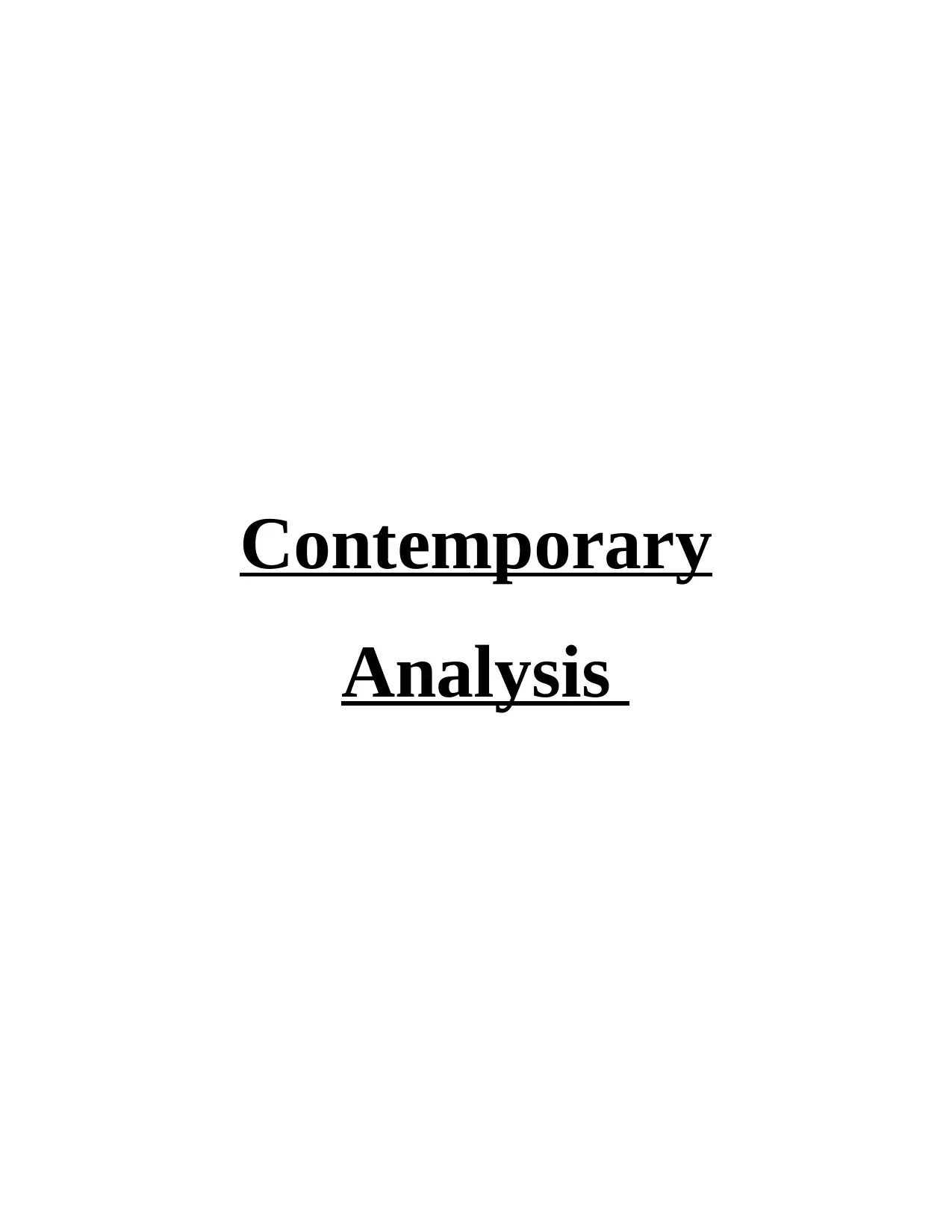
Contemporary
Analysis
Analysis
Paraphrase This Document
Need a fresh take? Get an instant paraphrase of this document with our AI Paraphraser
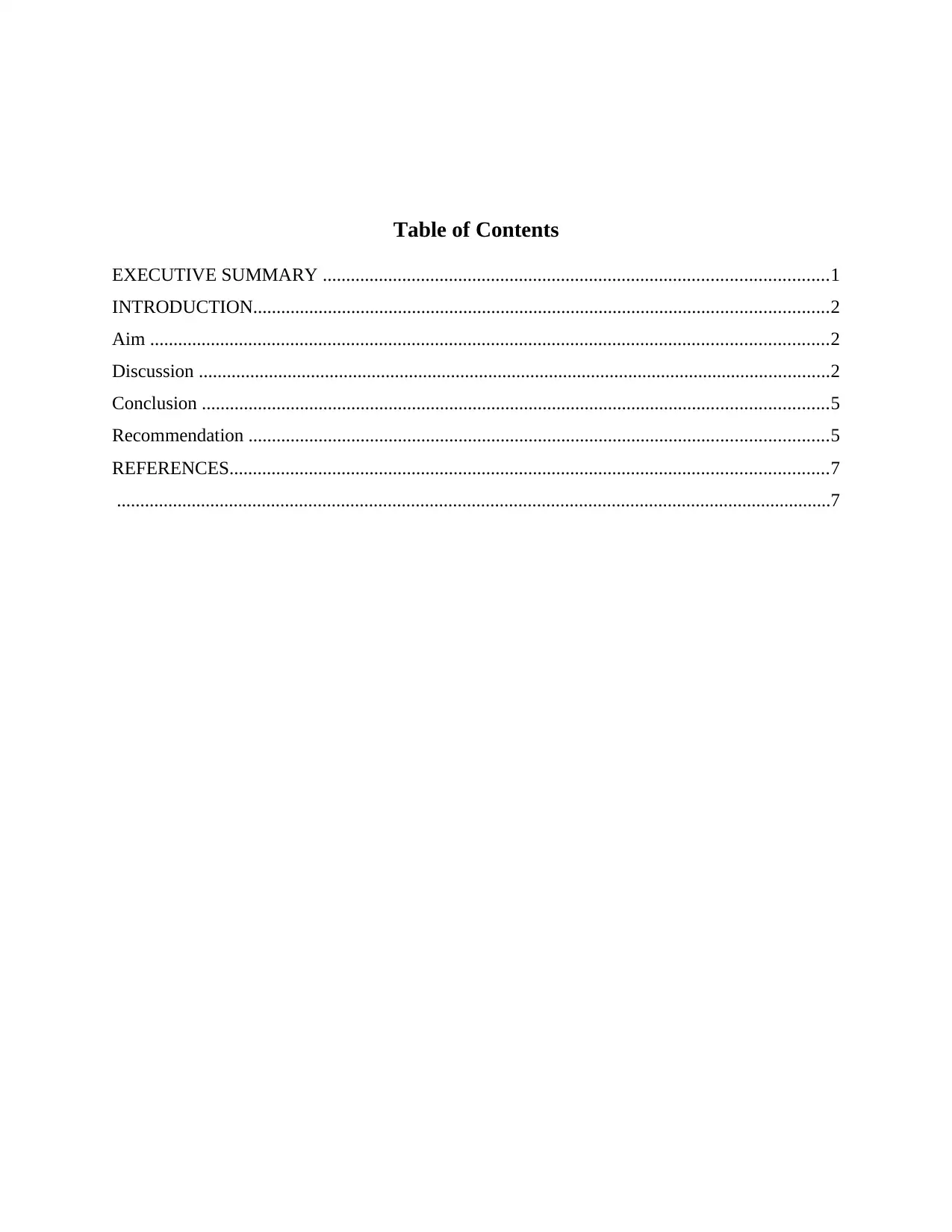
Table of Contents
EXECUTIVE SUMMARY ............................................................................................................1
INTRODUCTION...........................................................................................................................2
Aim .................................................................................................................................................2
Discussion .......................................................................................................................................2
Conclusion ......................................................................................................................................5
Recommendation ............................................................................................................................5
REFERENCES................................................................................................................................7
.........................................................................................................................................................7
EXECUTIVE SUMMARY ............................................................................................................1
INTRODUCTION...........................................................................................................................2
Aim .................................................................................................................................................2
Discussion .......................................................................................................................................2
Conclusion ......................................................................................................................................5
Recommendation ............................................................................................................................5
REFERENCES................................................................................................................................7
.........................................................................................................................................................7
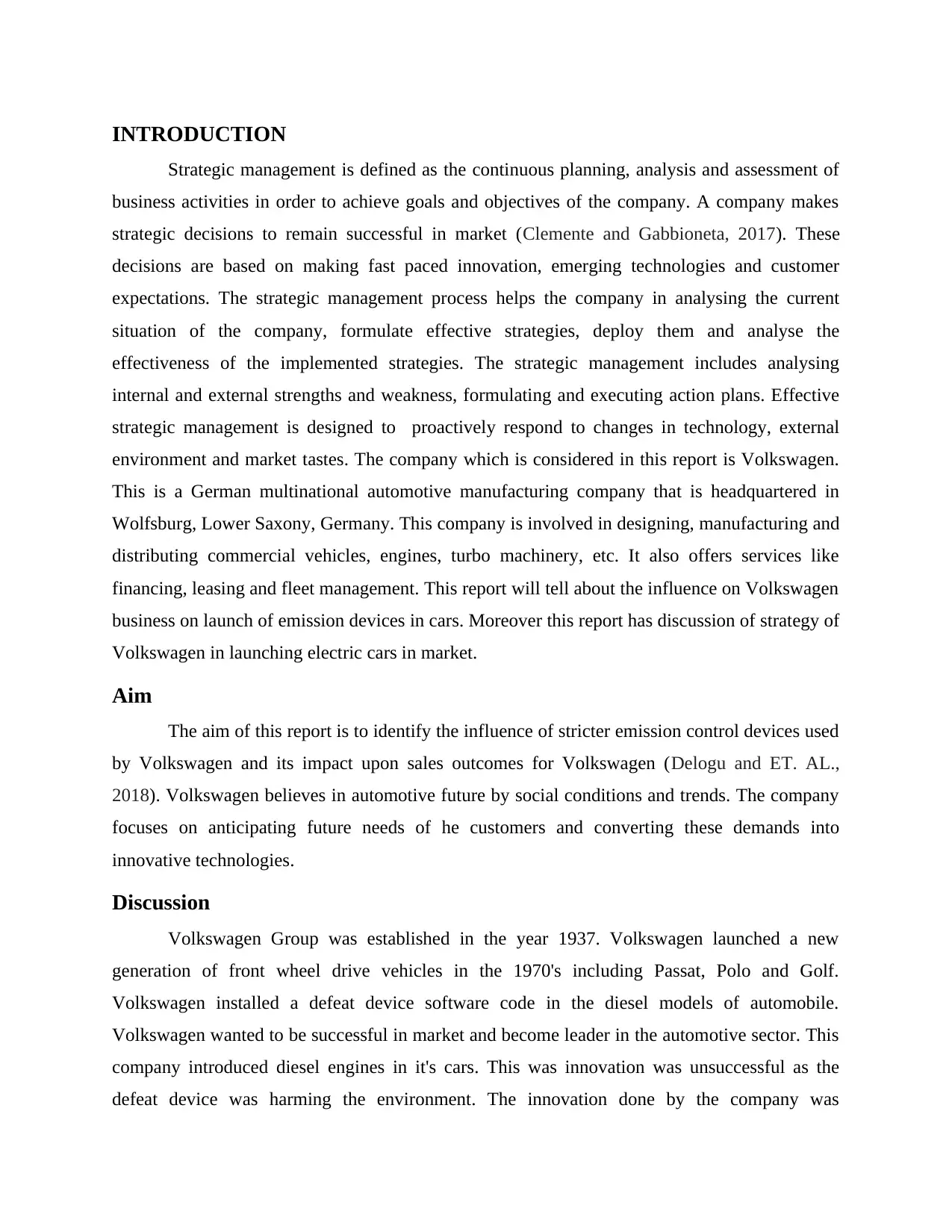
INTRODUCTION
Strategic management is defined as the continuous planning, analysis and assessment of
business activities in order to achieve goals and objectives of the company. A company makes
strategic decisions to remain successful in market (Clemente and Gabbioneta, 2017). These
decisions are based on making fast paced innovation, emerging technologies and customer
expectations. The strategic management process helps the company in analysing the current
situation of the company, formulate effective strategies, deploy them and analyse the
effectiveness of the implemented strategies. The strategic management includes analysing
internal and external strengths and weakness, formulating and executing action plans. Effective
strategic management is designed to proactively respond to changes in technology, external
environment and market tastes. The company which is considered in this report is Volkswagen.
This is a German multinational automotive manufacturing company that is headquartered in
Wolfsburg, Lower Saxony, Germany. This company is involved in designing, manufacturing and
distributing commercial vehicles, engines, turbo machinery, etc. It also offers services like
financing, leasing and fleet management. This report will tell about the influence on Volkswagen
business on launch of emission devices in cars. Moreover this report has discussion of strategy of
Volkswagen in launching electric cars in market.
Aim
The aim of this report is to identify the influence of stricter emission control devices used
by Volkswagen and its impact upon sales outcomes for Volkswagen (Delogu and ET. AL.,
2018). Volkswagen believes in automotive future by social conditions and trends. The company
focuses on anticipating future needs of he customers and converting these demands into
innovative technologies.
Discussion
Volkswagen Group was established in the year 1937. Volkswagen launched a new
generation of front wheel drive vehicles in the 1970's including Passat, Polo and Golf.
Volkswagen installed a defeat device software code in the diesel models of automobile.
Volkswagen wanted to be successful in market and become leader in the automotive sector. This
company introduced diesel engines in it's cars. This was innovation was unsuccessful as the
defeat device was harming the environment. The innovation done by the company was
Strategic management is defined as the continuous planning, analysis and assessment of
business activities in order to achieve goals and objectives of the company. A company makes
strategic decisions to remain successful in market (Clemente and Gabbioneta, 2017). These
decisions are based on making fast paced innovation, emerging technologies and customer
expectations. The strategic management process helps the company in analysing the current
situation of the company, formulate effective strategies, deploy them and analyse the
effectiveness of the implemented strategies. The strategic management includes analysing
internal and external strengths and weakness, formulating and executing action plans. Effective
strategic management is designed to proactively respond to changes in technology, external
environment and market tastes. The company which is considered in this report is Volkswagen.
This is a German multinational automotive manufacturing company that is headquartered in
Wolfsburg, Lower Saxony, Germany. This company is involved in designing, manufacturing and
distributing commercial vehicles, engines, turbo machinery, etc. It also offers services like
financing, leasing and fleet management. This report will tell about the influence on Volkswagen
business on launch of emission devices in cars. Moreover this report has discussion of strategy of
Volkswagen in launching electric cars in market.
Aim
The aim of this report is to identify the influence of stricter emission control devices used
by Volkswagen and its impact upon sales outcomes for Volkswagen (Delogu and ET. AL.,
2018). Volkswagen believes in automotive future by social conditions and trends. The company
focuses on anticipating future needs of he customers and converting these demands into
innovative technologies.
Discussion
Volkswagen Group was established in the year 1937. Volkswagen launched a new
generation of front wheel drive vehicles in the 1970's including Passat, Polo and Golf.
Volkswagen installed a defeat device software code in the diesel models of automobile.
Volkswagen wanted to be successful in market and become leader in the automotive sector. This
company introduced diesel engines in it's cars. This was innovation was unsuccessful as the
defeat device was harming the environment. The innovation done by the company was
⊘ This is a preview!⊘
Do you want full access?
Subscribe today to unlock all pages.

Trusted by 1+ million students worldwide
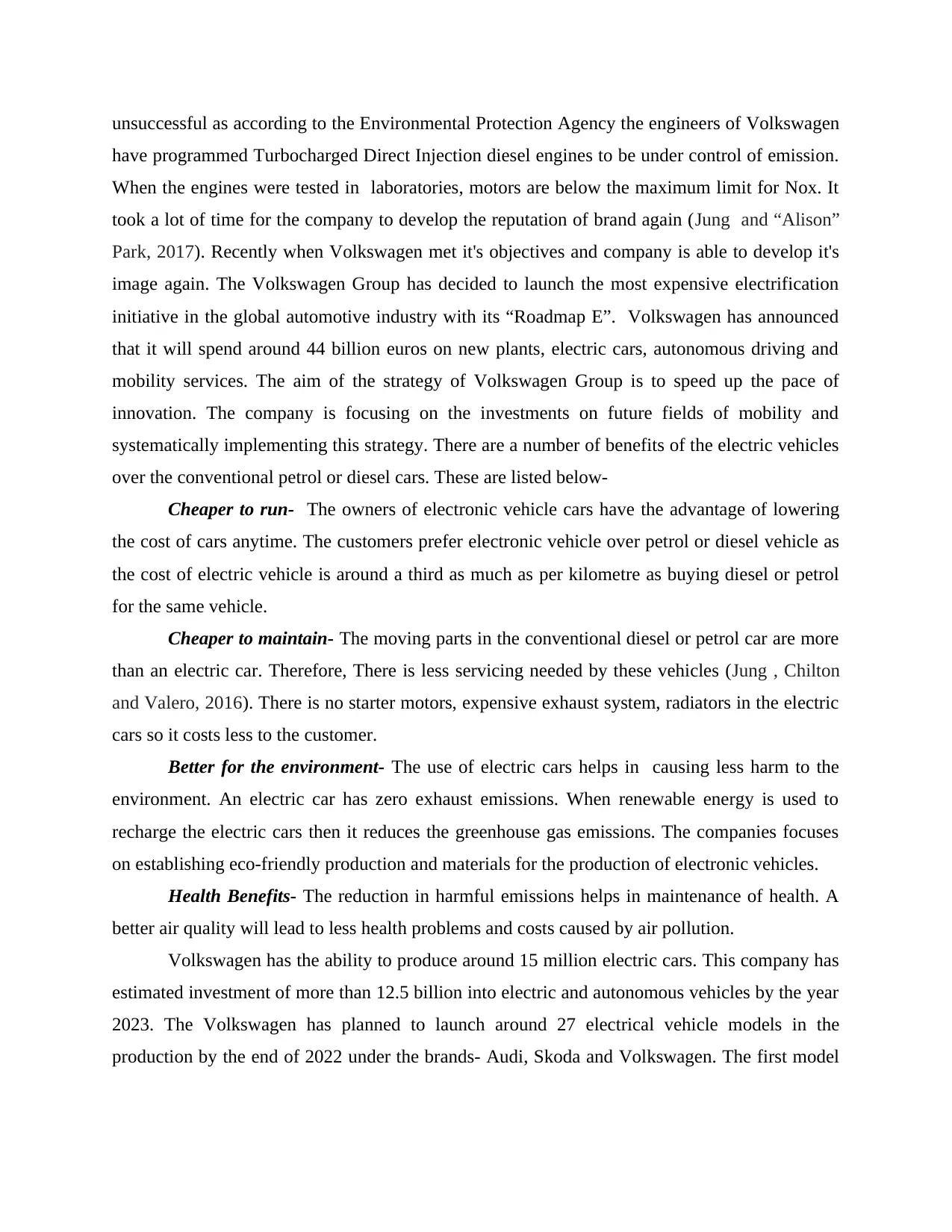
unsuccessful as according to the Environmental Protection Agency the engineers of Volkswagen
have programmed Turbocharged Direct Injection diesel engines to be under control of emission.
When the engines were tested in laboratories, motors are below the maximum limit for Nox. It
took a lot of time for the company to develop the reputation of brand again (Jung and “Alison”
Park, 2017). Recently when Volkswagen met it's objectives and company is able to develop it's
image again. The Volkswagen Group has decided to launch the most expensive electrification
initiative in the global automotive industry with its “Roadmap E”. Volkswagen has announced
that it will spend around 44 billion euros on new plants, electric cars, autonomous driving and
mobility services. The aim of the strategy of Volkswagen Group is to speed up the pace of
innovation. The company is focusing on the investments on future fields of mobility and
systematically implementing this strategy. There are a number of benefits of the electric vehicles
over the conventional petrol or diesel cars. These are listed below-
Cheaper to run- The owners of electronic vehicle cars have the advantage of lowering
the cost of cars anytime. The customers prefer electronic vehicle over petrol or diesel vehicle as
the cost of electric vehicle is around a third as much as per kilometre as buying diesel or petrol
for the same vehicle.
Cheaper to maintain- The moving parts in the conventional diesel or petrol car are more
than an electric car. Therefore, There is less servicing needed by these vehicles (Jung , Chilton
and Valero, 2016). There is no starter motors, expensive exhaust system, radiators in the electric
cars so it costs less to the customer.
Better for the environment- The use of electric cars helps in causing less harm to the
environment. An electric car has zero exhaust emissions. When renewable energy is used to
recharge the electric cars then it reduces the greenhouse gas emissions. The companies focuses
on establishing eco-friendly production and materials for the production of electronic vehicles.
Health Benefits- The reduction in harmful emissions helps in maintenance of health. A
better air quality will lead to less health problems and costs caused by air pollution.
Volkswagen has the ability to produce around 15 million electric cars. This company has
estimated investment of more than 12.5 billion into electric and autonomous vehicles by the year
2023. The Volkswagen has planned to launch around 27 electrical vehicle models in the
production by the end of 2022 under the brands- Audi, Skoda and Volkswagen. The first model
have programmed Turbocharged Direct Injection diesel engines to be under control of emission.
When the engines were tested in laboratories, motors are below the maximum limit for Nox. It
took a lot of time for the company to develop the reputation of brand again (Jung and “Alison”
Park, 2017). Recently when Volkswagen met it's objectives and company is able to develop it's
image again. The Volkswagen Group has decided to launch the most expensive electrification
initiative in the global automotive industry with its “Roadmap E”. Volkswagen has announced
that it will spend around 44 billion euros on new plants, electric cars, autonomous driving and
mobility services. The aim of the strategy of Volkswagen Group is to speed up the pace of
innovation. The company is focusing on the investments on future fields of mobility and
systematically implementing this strategy. There are a number of benefits of the electric vehicles
over the conventional petrol or diesel cars. These are listed below-
Cheaper to run- The owners of electronic vehicle cars have the advantage of lowering
the cost of cars anytime. The customers prefer electronic vehicle over petrol or diesel vehicle as
the cost of electric vehicle is around a third as much as per kilometre as buying diesel or petrol
for the same vehicle.
Cheaper to maintain- The moving parts in the conventional diesel or petrol car are more
than an electric car. Therefore, There is less servicing needed by these vehicles (Jung , Chilton
and Valero, 2016). There is no starter motors, expensive exhaust system, radiators in the electric
cars so it costs less to the customer.
Better for the environment- The use of electric cars helps in causing less harm to the
environment. An electric car has zero exhaust emissions. When renewable energy is used to
recharge the electric cars then it reduces the greenhouse gas emissions. The companies focuses
on establishing eco-friendly production and materials for the production of electronic vehicles.
Health Benefits- The reduction in harmful emissions helps in maintenance of health. A
better air quality will lead to less health problems and costs caused by air pollution.
Volkswagen has the ability to produce around 15 million electric cars. This company has
estimated investment of more than 12.5 billion into electric and autonomous vehicles by the year
2023. The Volkswagen has planned to launch around 27 electrical vehicle models in the
production by the end of 2022 under the brands- Audi, Skoda and Volkswagen. The first model
Paraphrase This Document
Need a fresh take? Get an instant paraphrase of this document with our AI Paraphraser
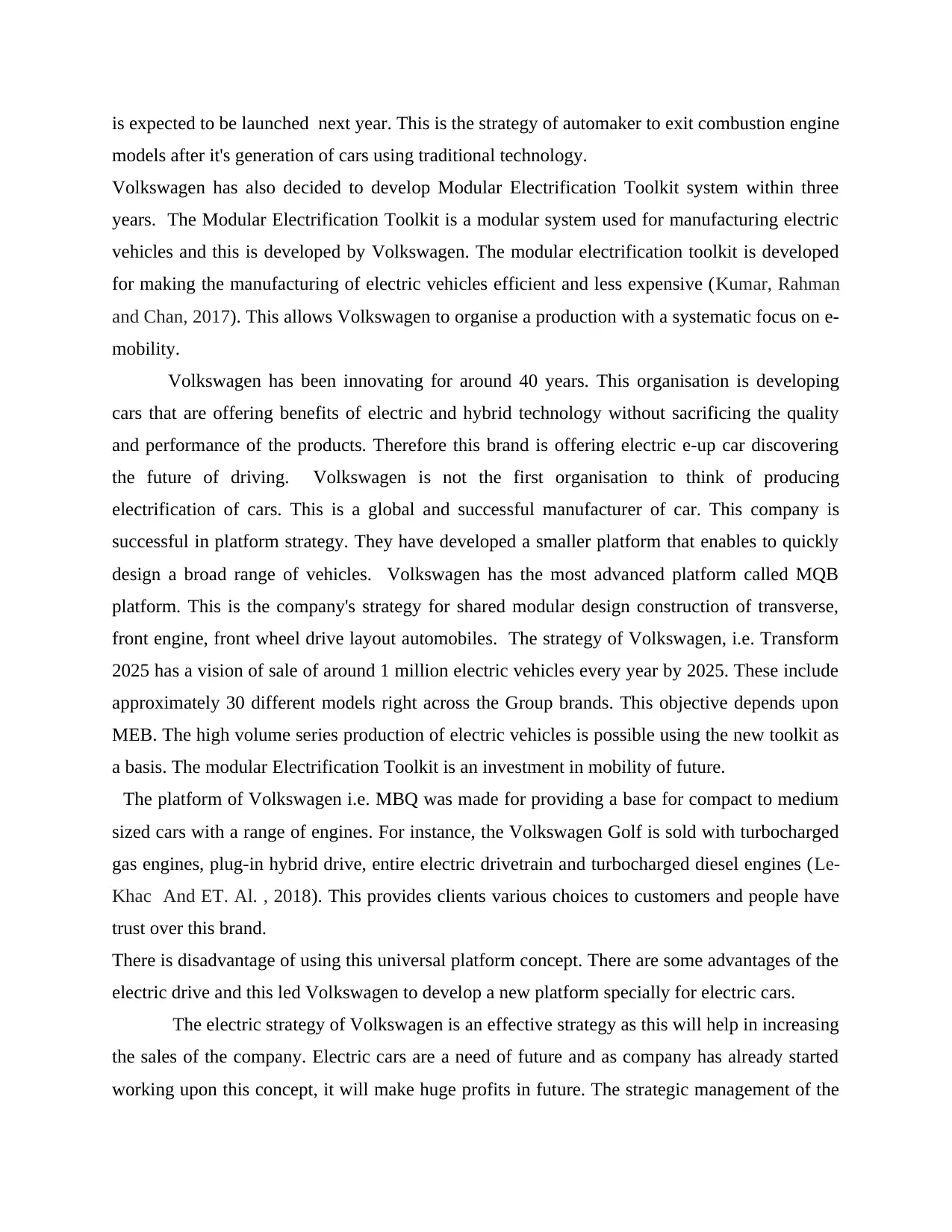
is expected to be launched next year. This is the strategy of automaker to exit combustion engine
models after it's generation of cars using traditional technology.
Volkswagen has also decided to develop Modular Electrification Toolkit system within three
years. The Modular Electrification Toolkit is a modular system used for manufacturing electric
vehicles and this is developed by Volkswagen. The modular electrification toolkit is developed
for making the manufacturing of electric vehicles efficient and less expensive (Kumar, Rahman
and Chan, 2017). This allows Volkswagen to organise a production with a systematic focus on e-
mobility.
Volkswagen has been innovating for around 40 years. This organisation is developing
cars that are offering benefits of electric and hybrid technology without sacrificing the quality
and performance of the products. Therefore this brand is offering electric e-up car discovering
the future of driving. Volkswagen is not the first organisation to think of producing
electrification of cars. This is a global and successful manufacturer of car. This company is
successful in platform strategy. They have developed a smaller platform that enables to quickly
design a broad range of vehicles. Volkswagen has the most advanced platform called MQB
platform. This is the company's strategy for shared modular design construction of transverse,
front engine, front wheel drive layout automobiles. The strategy of Volkswagen, i.e. Transform
2025 has a vision of sale of around 1 million electric vehicles every year by 2025. These include
approximately 30 different models right across the Group brands. This objective depends upon
MEB. The high volume series production of electric vehicles is possible using the new toolkit as
a basis. The modular Electrification Toolkit is an investment in mobility of future.
The platform of Volkswagen i.e. MBQ was made for providing a base for compact to medium
sized cars with a range of engines. For instance, the Volkswagen Golf is sold with turbocharged
gas engines, plug-in hybrid drive, entire electric drivetrain and turbocharged diesel engines (Le-
Khac And ET. Al. , 2018). This provides clients various choices to customers and people have
trust over this brand.
There is disadvantage of using this universal platform concept. There are some advantages of the
electric drive and this led Volkswagen to develop a new platform specially for electric cars.
The electric strategy of Volkswagen is an effective strategy as this will help in increasing
the sales of the company. Electric cars are a need of future and as company has already started
working upon this concept, it will make huge profits in future. The strategic management of the
models after it's generation of cars using traditional technology.
Volkswagen has also decided to develop Modular Electrification Toolkit system within three
years. The Modular Electrification Toolkit is a modular system used for manufacturing electric
vehicles and this is developed by Volkswagen. The modular electrification toolkit is developed
for making the manufacturing of electric vehicles efficient and less expensive (Kumar, Rahman
and Chan, 2017). This allows Volkswagen to organise a production with a systematic focus on e-
mobility.
Volkswagen has been innovating for around 40 years. This organisation is developing
cars that are offering benefits of electric and hybrid technology without sacrificing the quality
and performance of the products. Therefore this brand is offering electric e-up car discovering
the future of driving. Volkswagen is not the first organisation to think of producing
electrification of cars. This is a global and successful manufacturer of car. This company is
successful in platform strategy. They have developed a smaller platform that enables to quickly
design a broad range of vehicles. Volkswagen has the most advanced platform called MQB
platform. This is the company's strategy for shared modular design construction of transverse,
front engine, front wheel drive layout automobiles. The strategy of Volkswagen, i.e. Transform
2025 has a vision of sale of around 1 million electric vehicles every year by 2025. These include
approximately 30 different models right across the Group brands. This objective depends upon
MEB. The high volume series production of electric vehicles is possible using the new toolkit as
a basis. The modular Electrification Toolkit is an investment in mobility of future.
The platform of Volkswagen i.e. MBQ was made for providing a base for compact to medium
sized cars with a range of engines. For instance, the Volkswagen Golf is sold with turbocharged
gas engines, plug-in hybrid drive, entire electric drivetrain and turbocharged diesel engines (Le-
Khac And ET. Al. , 2018). This provides clients various choices to customers and people have
trust over this brand.
There is disadvantage of using this universal platform concept. There are some advantages of the
electric drive and this led Volkswagen to develop a new platform specially for electric cars.
The electric strategy of Volkswagen is an effective strategy as this will help in increasing
the sales of the company. Electric cars are a need of future and as company has already started
working upon this concept, it will make huge profits in future. The strategic management of the
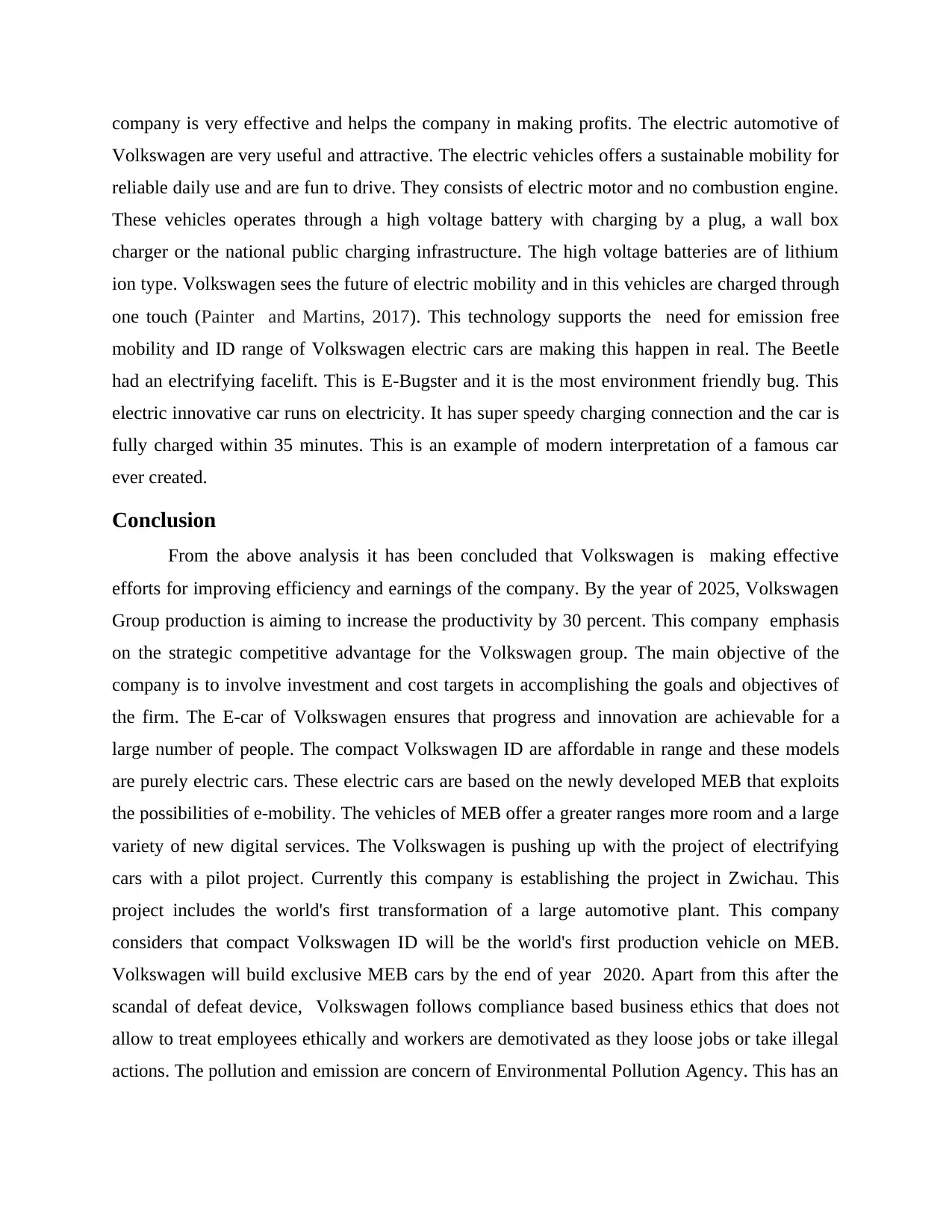
company is very effective and helps the company in making profits. The electric automotive of
Volkswagen are very useful and attractive. The electric vehicles offers a sustainable mobility for
reliable daily use and are fun to drive. They consists of electric motor and no combustion engine.
These vehicles operates through a high voltage battery with charging by a plug, a wall box
charger or the national public charging infrastructure. The high voltage batteries are of lithium
ion type. Volkswagen sees the future of electric mobility and in this vehicles are charged through
one touch (Painter and Martins, 2017). This technology supports the need for emission free
mobility and ID range of Volkswagen electric cars are making this happen in real. The Beetle
had an electrifying facelift. This is E-Bugster and it is the most environment friendly bug. This
electric innovative car runs on electricity. It has super speedy charging connection and the car is
fully charged within 35 minutes. This is an example of modern interpretation of a famous car
ever created.
Conclusion
From the above analysis it has been concluded that Volkswagen is making effective
efforts for improving efficiency and earnings of the company. By the year of 2025, Volkswagen
Group production is aiming to increase the productivity by 30 percent. This company emphasis
on the strategic competitive advantage for the Volkswagen group. The main objective of the
company is to involve investment and cost targets in accomplishing the goals and objectives of
the firm. The E-car of Volkswagen ensures that progress and innovation are achievable for a
large number of people. The compact Volkswagen ID are affordable in range and these models
are purely electric cars. These electric cars are based on the newly developed MEB that exploits
the possibilities of e-mobility. The vehicles of MEB offer a greater ranges more room and a large
variety of new digital services. The Volkswagen is pushing up with the project of electrifying
cars with a pilot project. Currently this company is establishing the project in Zwichau. This
project includes the world's first transformation of a large automotive plant. This company
considers that compact Volkswagen ID will be the world's first production vehicle on MEB.
Volkswagen will build exclusive MEB cars by the end of year 2020. Apart from this after the
scandal of defeat device, Volkswagen follows compliance based business ethics that does not
allow to treat employees ethically and workers are demotivated as they loose jobs or take illegal
actions. The pollution and emission are concern of Environmental Pollution Agency. This has an
Volkswagen are very useful and attractive. The electric vehicles offers a sustainable mobility for
reliable daily use and are fun to drive. They consists of electric motor and no combustion engine.
These vehicles operates through a high voltage battery with charging by a plug, a wall box
charger or the national public charging infrastructure. The high voltage batteries are of lithium
ion type. Volkswagen sees the future of electric mobility and in this vehicles are charged through
one touch (Painter and Martins, 2017). This technology supports the need for emission free
mobility and ID range of Volkswagen electric cars are making this happen in real. The Beetle
had an electrifying facelift. This is E-Bugster and it is the most environment friendly bug. This
electric innovative car runs on electricity. It has super speedy charging connection and the car is
fully charged within 35 minutes. This is an example of modern interpretation of a famous car
ever created.
Conclusion
From the above analysis it has been concluded that Volkswagen is making effective
efforts for improving efficiency and earnings of the company. By the year of 2025, Volkswagen
Group production is aiming to increase the productivity by 30 percent. This company emphasis
on the strategic competitive advantage for the Volkswagen group. The main objective of the
company is to involve investment and cost targets in accomplishing the goals and objectives of
the firm. The E-car of Volkswagen ensures that progress and innovation are achievable for a
large number of people. The compact Volkswagen ID are affordable in range and these models
are purely electric cars. These electric cars are based on the newly developed MEB that exploits
the possibilities of e-mobility. The vehicles of MEB offer a greater ranges more room and a large
variety of new digital services. The Volkswagen is pushing up with the project of electrifying
cars with a pilot project. Currently this company is establishing the project in Zwichau. This
project includes the world's first transformation of a large automotive plant. This company
considers that compact Volkswagen ID will be the world's first production vehicle on MEB.
Volkswagen will build exclusive MEB cars by the end of year 2020. Apart from this after the
scandal of defeat device, Volkswagen follows compliance based business ethics that does not
allow to treat employees ethically and workers are demotivated as they loose jobs or take illegal
actions. The pollution and emission are concern of Environmental Pollution Agency. This has an
⊘ This is a preview!⊘
Do you want full access?
Subscribe today to unlock all pages.

Trusted by 1+ million students worldwide
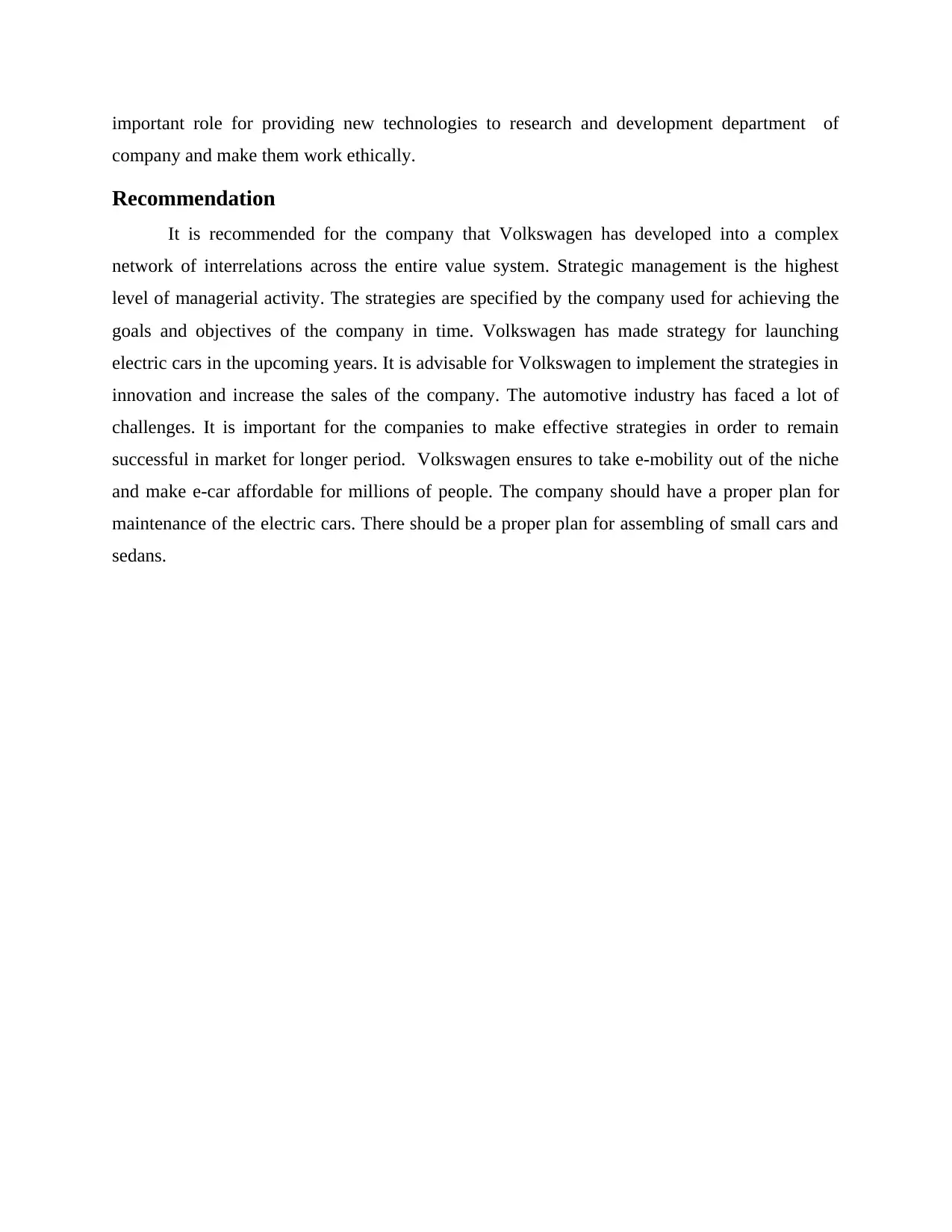
important role for providing new technologies to research and development department of
company and make them work ethically.
Recommendation
It is recommended for the company that Volkswagen has developed into a complex
network of interrelations across the entire value system. Strategic management is the highest
level of managerial activity. The strategies are specified by the company used for achieving the
goals and objectives of the company in time. Volkswagen has made strategy for launching
electric cars in the upcoming years. It is advisable for Volkswagen to implement the strategies in
innovation and increase the sales of the company. The automotive industry has faced a lot of
challenges. It is important for the companies to make effective strategies in order to remain
successful in market for longer period. Volkswagen ensures to take e-mobility out of the niche
and make e-car affordable for millions of people. The company should have a proper plan for
maintenance of the electric cars. There should be a proper plan for assembling of small cars and
sedans.
company and make them work ethically.
Recommendation
It is recommended for the company that Volkswagen has developed into a complex
network of interrelations across the entire value system. Strategic management is the highest
level of managerial activity. The strategies are specified by the company used for achieving the
goals and objectives of the company in time. Volkswagen has made strategy for launching
electric cars in the upcoming years. It is advisable for Volkswagen to implement the strategies in
innovation and increase the sales of the company. The automotive industry has faced a lot of
challenges. It is important for the companies to make effective strategies in order to remain
successful in market for longer period. Volkswagen ensures to take e-mobility out of the niche
and make e-car affordable for millions of people. The company should have a proper plan for
maintenance of the electric cars. There should be a proper plan for assembling of small cars and
sedans.
Paraphrase This Document
Need a fresh take? Get an instant paraphrase of this document with our AI Paraphraser
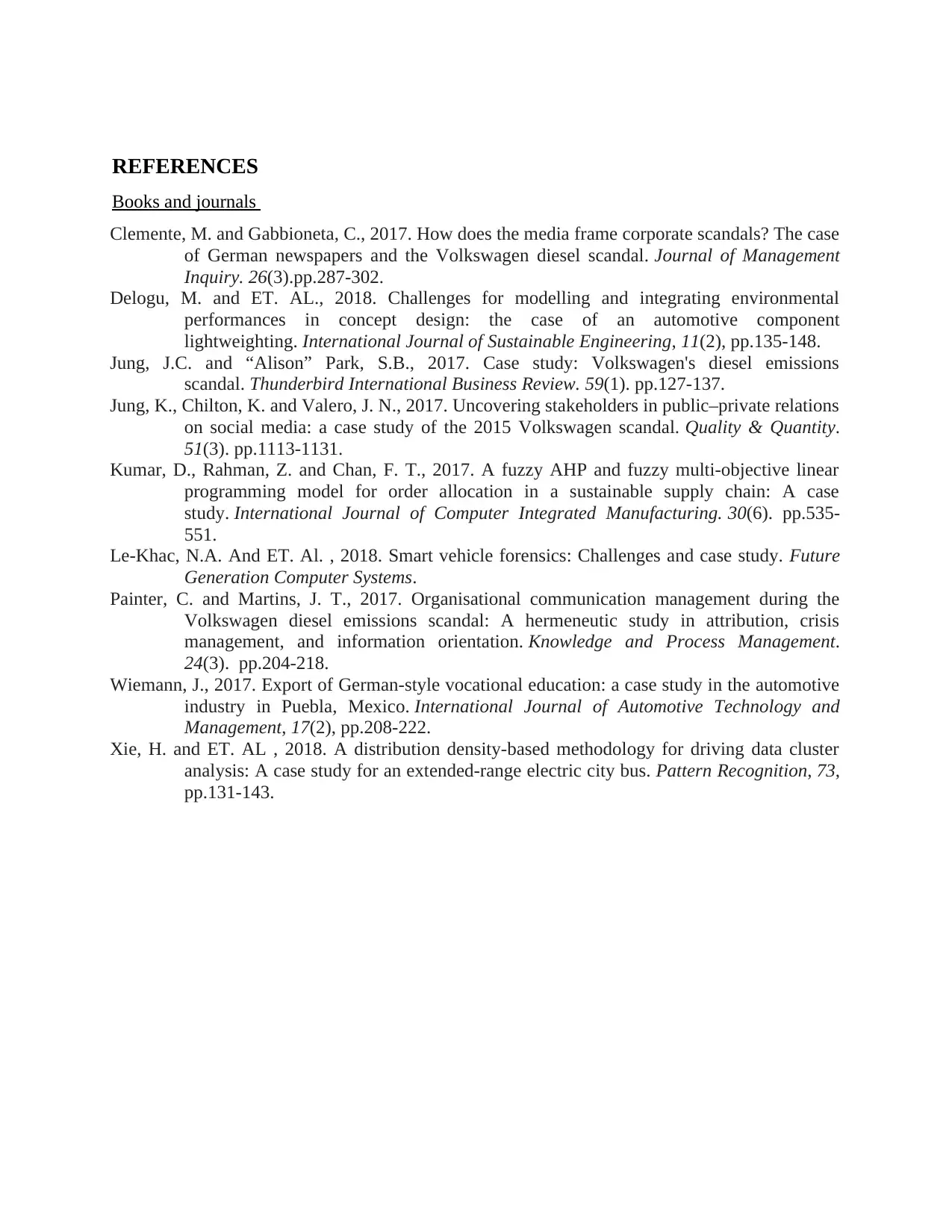
REFERENCES
Books and journals
Clemente, M. and Gabbioneta, C., 2017. How does the media frame corporate scandals? The case
of German newspapers and the Volkswagen diesel scandal. Journal of Management
Inquiry. 26(3).pp.287-302.
Delogu, M. and ET. AL., 2018. Challenges for modelling and integrating environmental
performances in concept design: the case of an automotive component
lightweighting. International Journal of Sustainable Engineering, 11(2), pp.135-148.
Jung, J.C. and “Alison” Park, S.B., 2017. Case study: Volkswagen's diesel emissions
scandal. Thunderbird International Business Review. 59(1). pp.127-137.
Jung, K., Chilton, K. and Valero, J. N., 2017. Uncovering stakeholders in public–private relations
on social media: a case study of the 2015 Volkswagen scandal. Quality & Quantity.
51(3). pp.1113-1131.
Kumar, D., Rahman, Z. and Chan, F. T., 2017. A fuzzy AHP and fuzzy multi-objective linear
programming model for order allocation in a sustainable supply chain: A case
study. International Journal of Computer Integrated Manufacturing. 30(6). pp.535-
551.
Le-Khac, N.A. And ET. Al. , 2018. Smart vehicle forensics: Challenges and case study. Future
Generation Computer Systems.
Painter, C. and Martins, J. T., 2017. Organisational communication management during the
Volkswagen diesel emissions scandal: A hermeneutic study in attribution, crisis
management, and information orientation. Knowledge and Process Management.
24(3). pp.204-218.
Wiemann, J., 2017. Export of German-style vocational education: a case study in the automotive
industry in Puebla, Mexico. International Journal of Automotive Technology and
Management, 17(2), pp.208-222.
Xie, H. and ET. AL , 2018. A distribution density-based methodology for driving data cluster
analysis: A case study for an extended-range electric city bus. Pattern Recognition, 73,
pp.131-143.
Books and journals
Clemente, M. and Gabbioneta, C., 2017. How does the media frame corporate scandals? The case
of German newspapers and the Volkswagen diesel scandal. Journal of Management
Inquiry. 26(3).pp.287-302.
Delogu, M. and ET. AL., 2018. Challenges for modelling and integrating environmental
performances in concept design: the case of an automotive component
lightweighting. International Journal of Sustainable Engineering, 11(2), pp.135-148.
Jung, J.C. and “Alison” Park, S.B., 2017. Case study: Volkswagen's diesel emissions
scandal. Thunderbird International Business Review. 59(1). pp.127-137.
Jung, K., Chilton, K. and Valero, J. N., 2017. Uncovering stakeholders in public–private relations
on social media: a case study of the 2015 Volkswagen scandal. Quality & Quantity.
51(3). pp.1113-1131.
Kumar, D., Rahman, Z. and Chan, F. T., 2017. A fuzzy AHP and fuzzy multi-objective linear
programming model for order allocation in a sustainable supply chain: A case
study. International Journal of Computer Integrated Manufacturing. 30(6). pp.535-
551.
Le-Khac, N.A. And ET. Al. , 2018. Smart vehicle forensics: Challenges and case study. Future
Generation Computer Systems.
Painter, C. and Martins, J. T., 2017. Organisational communication management during the
Volkswagen diesel emissions scandal: A hermeneutic study in attribution, crisis
management, and information orientation. Knowledge and Process Management.
24(3). pp.204-218.
Wiemann, J., 2017. Export of German-style vocational education: a case study in the automotive
industry in Puebla, Mexico. International Journal of Automotive Technology and
Management, 17(2), pp.208-222.
Xie, H. and ET. AL , 2018. A distribution density-based methodology for driving data cluster
analysis: A case study for an extended-range electric city bus. Pattern Recognition, 73,
pp.131-143.
1 out of 8
Related Documents
Your All-in-One AI-Powered Toolkit for Academic Success.
+13062052269
info@desklib.com
Available 24*7 on WhatsApp / Email
![[object Object]](/_next/static/media/star-bottom.7253800d.svg)
Unlock your academic potential
Copyright © 2020–2026 A2Z Services. All Rights Reserved. Developed and managed by ZUCOL.





